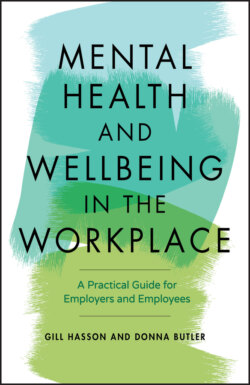Читать книгу Mental Health and Wellbeing in the Workplace - Gill Hasson - Страница 18
Depression
ОглавлениеDepression is a low mood that lasts for a long time and affects your everyday life. In its mildest form, depression can mean feeling sad, lacking enthusiasm, feeling that you have little control and being generally in low spirits.
We all feel down or sad at times. Sadness is the normal reaction caused by a loss or failure that we experience. When you lose something or someone you love, when you fail to achieve something – your hopes fail to materialize, or a good situation comes to an end – this experience of loss can be felt and expressed as sadness.
Depression doesn't necessarily stop you leading your normal life but it does make everything harder to do – to function well at work, to focus on tasks and complete them, for example – and outside of work, feeling depressed makes things seem less worthwhile. At its most severe, depression can result in feelings of despair and worthlessness and that you have no control over situations. It can lead to thoughts of harming oneself or others, or can lead to feeling suicidal.
Some common signs of depression may include:
Emotional and physical responses:
Feeling restless, agitated, or irritable
Feelings of guilt and worthlessness
Little self-confidence or self-esteem
Feeling down; a flat mood that doesn't shift; apathetic; empty and numb
Feeling detached; a sense of unreality
Little or no pleasure in life or things. Unable to see fun or humour in any situation
Unable to relate to other people, feeling isolated from them
Finding no pleasure in life or things you used to enjoy
Not looking forward to anything or planning anything
Feelings of hopelessness and despair.
How you might behave:
Distancing yourself from family and friends
Avoiding social events and activities you used to enjoy
Moving slowly or, unable to rest, always on the move.
